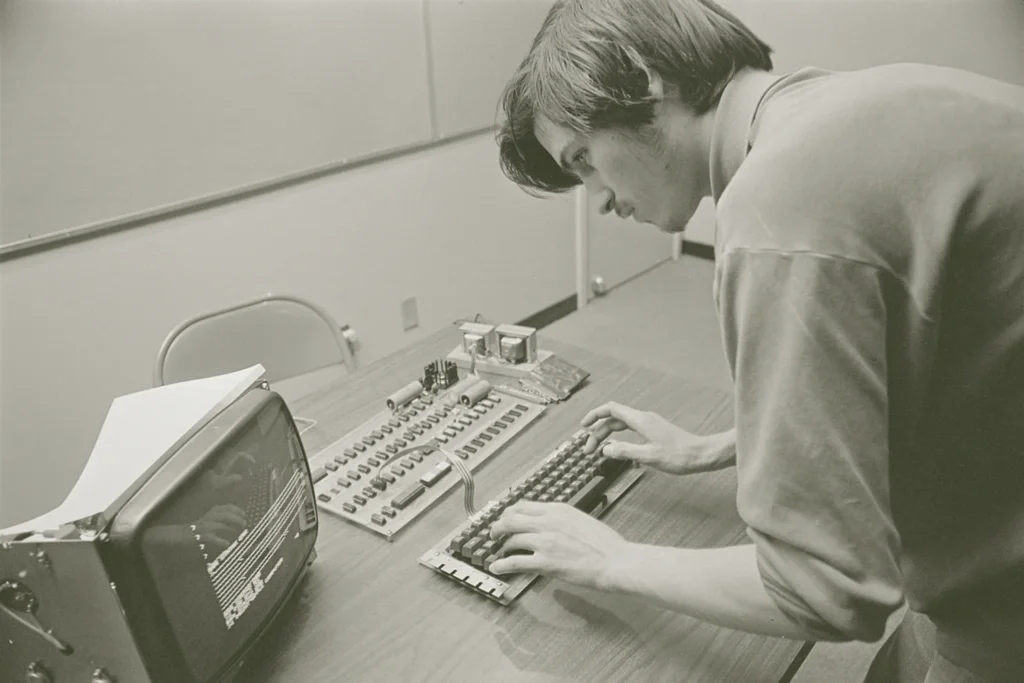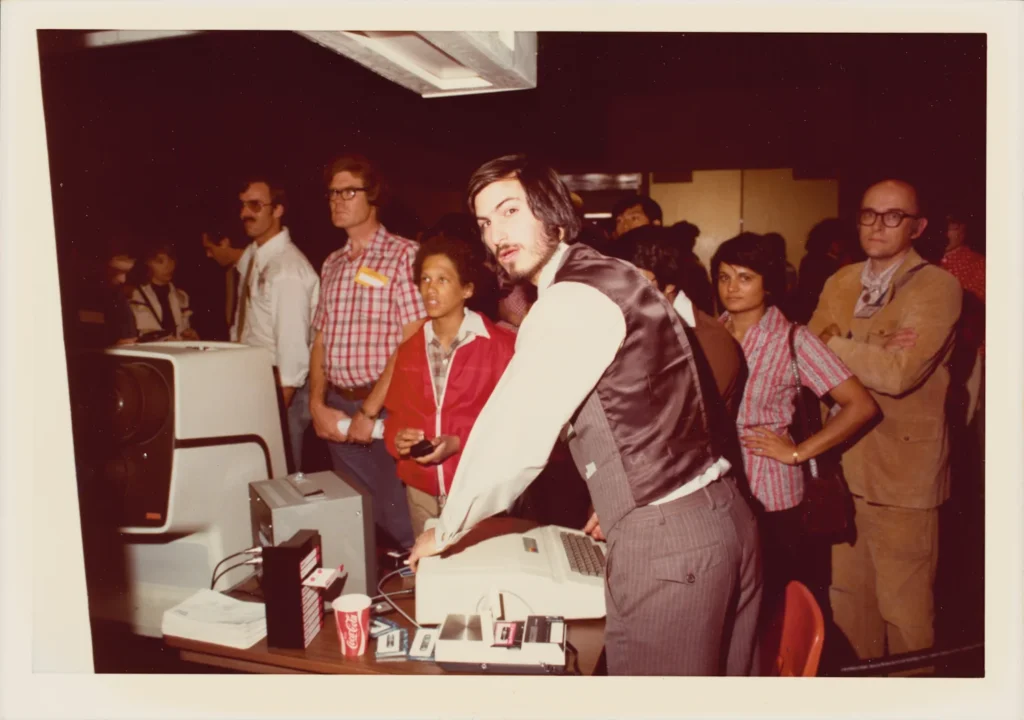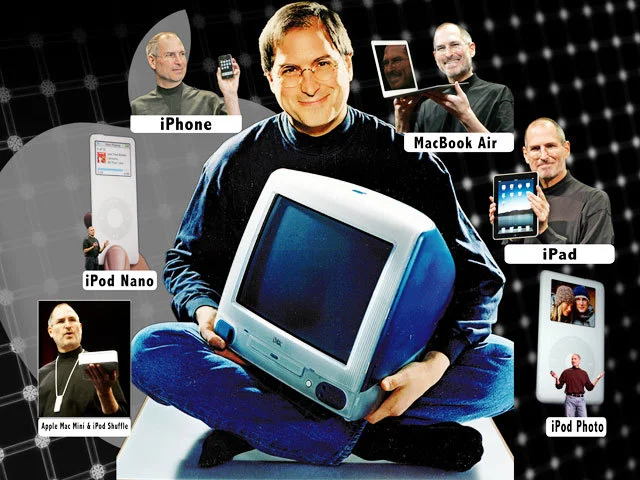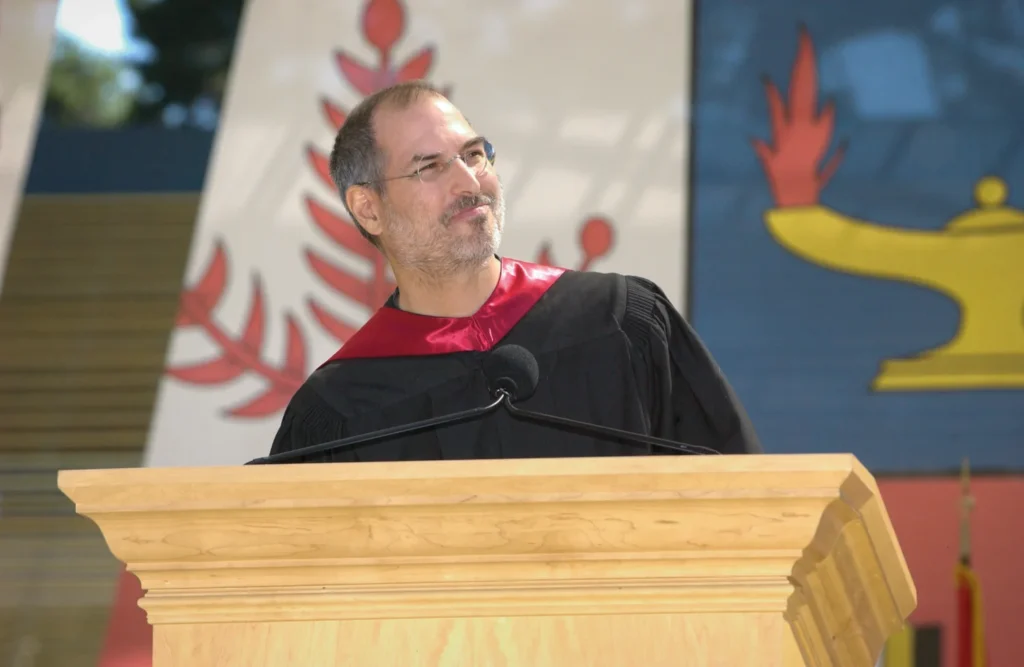
Early Life and the Spark of Innovation
Steven Paul Jobs was born on February 24, 1955, in San Francisco, California. Adopted shortly after birth, he grew up in Cupertino, the heart of Silicon Valley. From an early age, Jobs displayed a fascination with electronics and mechanics. He often tinkered with gadgets, learning by dismantling and reassembling them, a hands-on curiosity that would later define his approach to technology and innovation.
His teenage years were marked by exploration into philosophy, spirituality, and creativity—elements that would shape his unique approach to business and product design.

The Birth of Apple: Turning a Garage into a Global Empire
In 1976, Jobs co-founded Apple Computer with Steve Wozniak and Ronald Wayne in his parents’ garage. Their first creation, the Apple I, was revolutionary for its time but modest in scale. The launch of the Apple II in 1977 changed everything. It became one of the first highly successful mass-produced personal computers, with color graphics and an approachable design that made computing accessible to everyone.
Apple wasn’t just about computers—it was about creating a lifestyle and an experience. Jobs’ attention to detail and insistence on beautiful, intuitive designs differentiated Apple from its competitors and set a new standard in technology.
First Setbacks and Entrepreneurial Lessons
Despite his early successes, Jobs’ journey wasn’t smooth. In 1985, due to internal power struggles, he was ousted from Apple. This could have ended many careers, but Jobs used it as a launchpad for further innovation:
- Founding NeXT: Jobs started NeXT to create high-end computers for businesses and universities. Though the products weren’t commercial blockbusters, the technology would later become the backbone of macOS.
- Acquiring Pixar: Jobs bought The Graphics Group from Lucasfilm, which became Pixar. Under his leadership, Pixar produced Toy Story (1995), the first fully computer-animated feature film, revolutionizing the animation industry and creating a multi-billion-dollar company.
These moves showed his remarkable ability to turn setbacks into opportunities—a core lesson for any entrepreneur.

Return to Apple: Masterstroke of Entrepreneurship
Jobs returned to Apple in 1997 when the company was near bankruptcy. His strategic moves during this period are considered legendary:
- Streamlining Product Lines: He reduced Apple’s confusing lineup of products to a few key offerings, allowing the company to focus resources and innovation.
- Brand Reinvention: The iconic “Think Different” campaign re-established Apple’s identity as a bold, creative company.
- Partnerships: Secured a $150 million investment from rival Microsoft to stabilize Apple—a controversial yet visionary move.
- Retail Strategy: Launched Apple Stores, giving the company direct interaction with customers and controlling the brand experience.
These moves showcased Jobs’ deep understanding of market psychology, brand building, and strategic business planning.

Iconic Products and Global Impact
Under Jobs’ leadership, Apple introduced products that redefined industries:
- iMac (1998): A colorful, all-in-one computer breaking conventional design norms.
- iPod (2001): Revolutionized the music industry and how people consumed media.
- iTunes Store (2003): Changed the economics of music distribution.
- iPhone (2007): Combined phone, music player, and internet device into one, altering communication forever.
- App Store (2008): Created a new economy for software developers.
- iPad (2010): Established a new category in personal computing.
Jobs’ products were not just technological marvels—they were cultural phenomena that impacted society globally.

Overcoming Personal Struggles
Jobs faced significant personal challenges. Diagnosed with a rare pancreatic neuroendocrine tumor in 2003, he confronted his illness with courage, continuing to lead Apple while undergoing treatment. His battle with cancer and his relentless pursuit of perfection illustrated his resilience, focus, and passion—traits essential to his entrepreneurial journey.
Entrepreneurial Genius: Key Moves That Defined His Career
- Focus on User Experience: Jobs obsessed over every detail, from product design to packaging. This focus created emotional connections with consumers.
- Risk-Taking: Launching the iPhone without a physical keyboard, betting on touchscreen technology, was a bold gamble that redefined smartphones.
- Brand Cultivation: Apple wasn’t just a company—it was a lifestyle brand that commanded loyalty and premium pricing.
- Vertical Integration: Jobs controlled hardware, software, and retail, ensuring a seamless customer experience.
- Innovation Culture: He cultivated teams that pushed boundaries, blending art and technology to produce breakthrough products.
These moves reflect strategic foresight, risk-taking, and a deep understanding of human behavior—the pillars of entrepreneurial success.

Legacy and Contributions to Society
Steve Jobs’ influence goes beyond Apple. He redefined personal computing, telecommunications, music, and animation. His philosophy of combining technology with the liberal arts inspired generations of innovators. Jobs’ insistence on creating products people didn’t even know they needed shifted industries and shaped modern society.
Though his philanthropy was less publicized, his work with Pixar revolutionized storytelling and entertainment. His leadership philosophy, entrepreneurial spirit, and focus on innovation continue to inspire entrepreneurs worldwide.





